Andrew Haigh, One of Our Best Filmmakers, Has Always Worked Under the Radar. That Changes With ‘All of Us Strangers’

- Oops!Something went wrong.Please try again later.
- Oops!Something went wrong.Please try again later.
- Oops!Something went wrong.Please try again later.
Vivien Killilea / Getty Images for ABA
“It’s so funny when you make a film like this that's quite personal,” the British filmmaker Andrew Haigh tells me, when I meet him for coffee on a warm autumn afternoon at the hotel he’s staying at. “And then suddenly you're sharing it with a thousand people in the Alice Tully Hall in New York.”
The director was in town to screen his latest film All of Us Strangers, the much-anticipated supernatural drama starring Andrew Scott and Paul Mescal, at the New York Film Festival. At a Q&A that followed one of the screenings, Haigh’s editor Jonathan Alberts gently chided him in front of the audience at Alice Tully Hall in the Lincoln Center: “I feel like the film was a kind of expensive therapy.”
Haigh introduced the film at the screening as “the most personal” he’s ever done—a curious thing to say perhaps about an adaptation of a spooky 1987 Japanese novel about ghosts.
All of Us Strangers is based on the Taichi Yamada novel Strangers, a chilling story about a divorced, lonely screenwriter haunted by the ghosts of his dead parents and the seductive, mysterious neighbor he starts an affair with. In adapting the story for the screen, Haigh found a way to move the story from Tokyo in the ‘80s to contemporary London and shift enough elements of the story to make it personal. In doing so, he has utterly queered the material—turning Yamada’s jaded, beer-sipping divorcee into a gay British screenwriter who fends off loneliness with Top of the Pops reruns.
“It's interesting,” Haigh says, “to have an adaptation of the plot structure and then imprint my experience onto that plot structure and intertwine them together.”
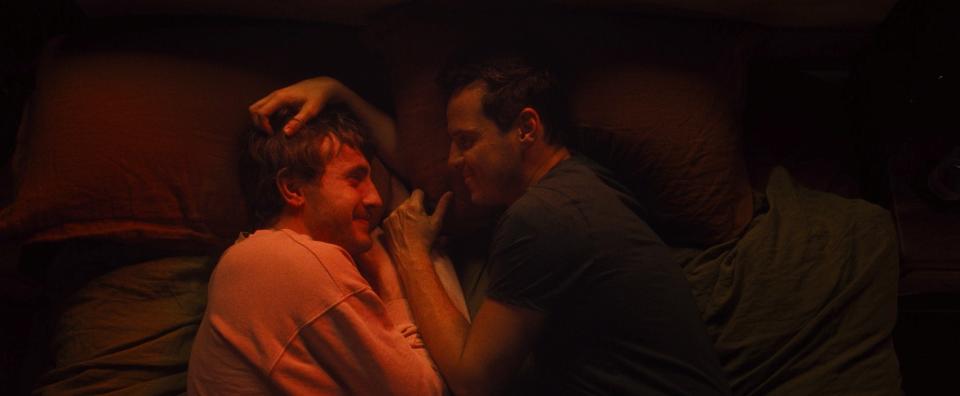
Haigh’s version of Strangers tells the story of Adam (Scott), a screenwriter trying to work on a script set in 1987 about the parents he lost before he turned 12, as he starts an affair with an attractive, mysterious neighbor (Mescal). His process takes him back to his childhood home, where he discovers that his mother (Claire Foy) and his father (Jamie Bell) are, magically still living there, frozen at the ages he last saw them. In introducing his adult self to his parents, Adam must wrestle with anxieties and pain he thought he’d discarded long ago.
“As an adult, you carry around all of that past and you think it's fine. You think it's gone, you think you've moved on,” Haigh says. “And then it doesn't take much to be [back there].”
In the last decade or so, Haigh has established himself as contemporary cinema’s master miniaturist, a filmmaker who understands that it’s often the smallest moments in our lives that have seismic, world-shifting impacts on our relationships. “Those conversations, whether it's in bed or on a sofa, wherever, are so important,” he says. “It's when things change within your relationship. With one conversation, you can grow and deepen a relationship incredibly.”
That reputation was established with Weekend, a small film that crept through the back door in 2011 and has only grown in legend through the years. Haigh focused most of the action in Weekend in the modestly-sized apartment where the movie’s protagonists get to know each other. In doing so, he made every gesture count, making that bedroom feel like the whole world. “In many ways, the Western queer film world lives in the aftermath of Andrew Haigh’s Weekend,” the film critic Kyle Turner wrote in his book The Queer Film Guide.
“Honestly, I kind of don't mind that I'm remembered for that more than anything else,” Haigh says. “Because I really thought nobody would see that film when it came out. It was made for nothing—it was under a hundred thousand pounds. And so the fact that it has had an effect on people—and I still get emails and letters and things, [about how] it's been really important to people—is beautiful. I mean, that's why I wanted to make it.”
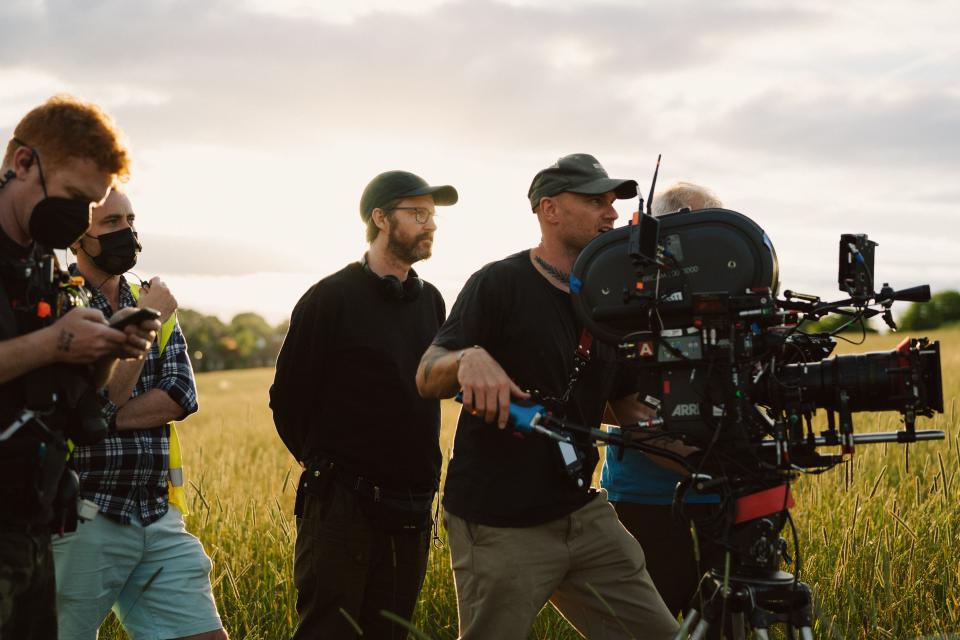
Strangers
I tell Haigh that when I first saw Weekend in my early 20s, it seemed almost aspirational—before I grew up and realized the boys in the film were devastatingly lonely. As Fire Island director Andrew Ahn once said, “It’s safe to say that Haigh’s Weekend messed up an entire generation of gay men looking for love.”
Haigh chuckles at that notion. “I know! I’m kind of like, ‘I’m the king of the sad boys,’” he says, laughing. “Hopefully I've not ruined lots of young gay boys by [making them think] ‘I want to be a sad, sad grown-up.’”
What happened to Weekend—a muted initial response, a reputation that snowballs into legend through the years—has happened to most of Haigh’s other films, for better or worse. But as Haigh makes his return with All of Us Strangers, he’s returning to a film culture that suddenly recognizes him as a master.
“I think the last shot of 45 Years is one of the all-time great shots,” Midsommar director Ari Aster said in an interview. “I feel confident in saying that even though it just came out a few years ago.” In order to prepare for her breakout role in Past Lives, the actress Greta Lee recently admitted that she saw 45 Years “I think 45 times.” Jonathan Bailey, meanwhile, has said that Weekend informed how he approached the sex scenes in his acclaimed limited series Fellow Travelers.
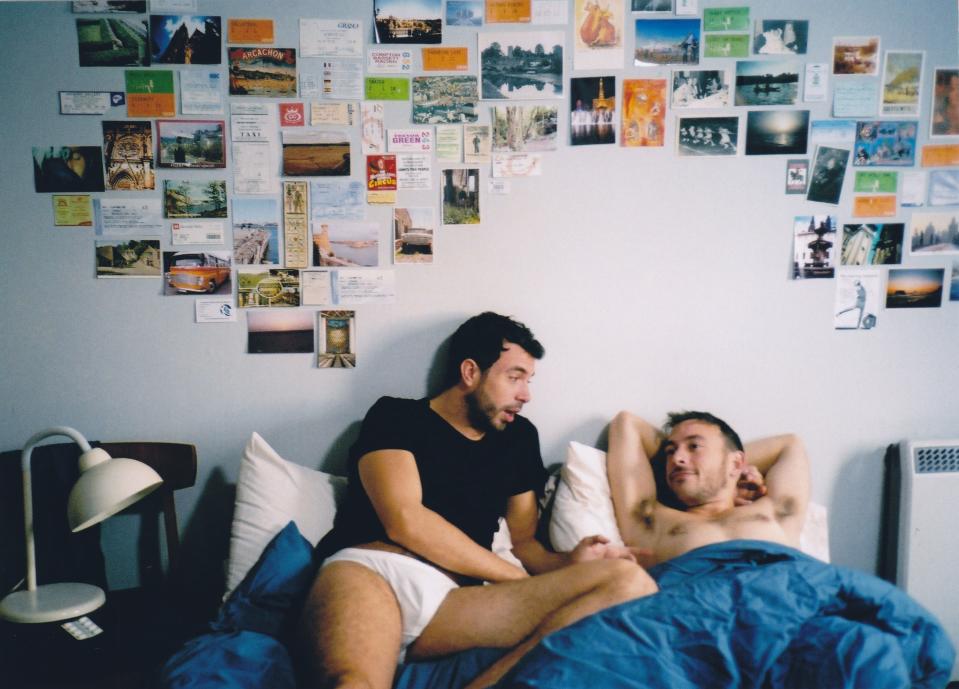
Weekend
“Andrew's been doing what he's doing for many, many years, and his approach to filmmaking has been consistent,” says the actor Russell Tovey, who worked with Haigh on the HBO series Looking. “And you look back to Greek Pete, Lean on Pete, Weekend obviously—it feels like it's the same world… It feels like there's this line that goes through everything.”
“If you look at the visual arts, a lot of artists, what they drew as kids has remained their practice,” Tovey says. “They've just gotten better at it. And I think Andrew from the start, knew his voice and just mined it to tell these stories.”
In some ways, All of Us Strangers feels like a culmination for Haigh. Like a greatest-hits collection, the film sees Haigh touching on previous themes and displaying a more lived-in understanding of them. There’s the intimacy and vulnerability of Weekend in Scott and Mescal’s sexy early scenes together. There’s Lean On Pete’s desperate desire for family in the conversations between Adam and his parents. And what is 45 Years—a film about a couple being haunted by the memory of a former lover—if not a ghost story?
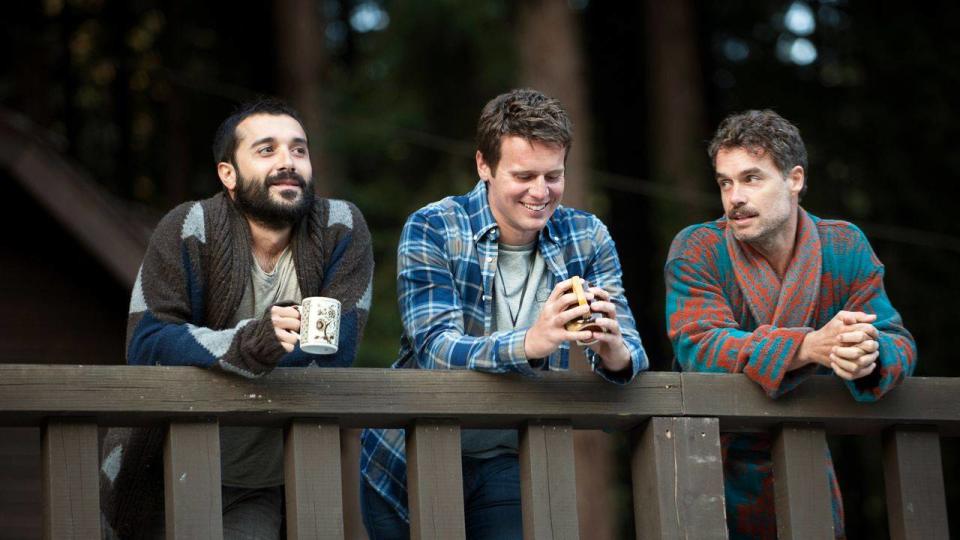
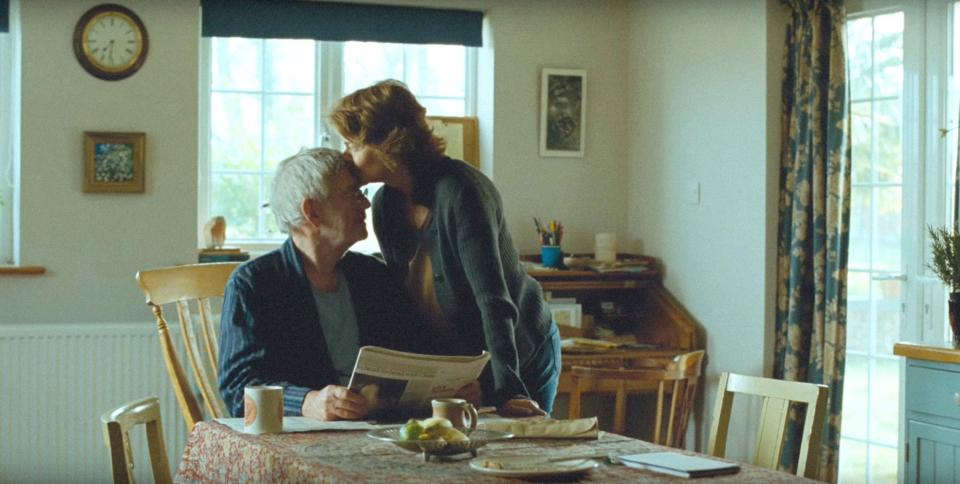
MCDFOFI EC036
“I think what I wanted to do with this film was start from a place that was that miniaturist idea, and then as the film kind of develops and spins apart and breaks into different things, really sort of expand it and send it skyward,” Haigh says.
That grab at transcendence, at the metaphysical, is seen most clearly in a scene in All of Us Strangers where the adult Adam wakes up in his childhood home to find his parents in their living room, decorating the Christmas tree as the Pet Shop Boys perform “Always On My Mind” on TV. In one of the film’s most moving moments, his mother mouths the words of “Always On My Mind” to him, to tell him she loves him.
“How do we express how we feel to the people we love? It's not always just sitting down and having a conversation and telling them,” Haigh says. “We do it through different ways.” And sometimes, that happens through a pop song.
“Pop music has the ability to be really sincere and open and honest about feelings,” Haigh says. “It allows us to express something really important. And I think for a lot of kids but especially queer kids, pop music can say something about their soul and what they're feeling and what they're saying.”
Pop music was very important to Haigh growing up as a kid in the ‘80s. At a time of great pain and confusion in his life, he sought refuge in the melodies of the Pet Shop Boys, Frankie Goes to Hollywood and The Housemartins. Fittingly, those ‘80s acts figure as crucial needle drops in All of Us Strangers.
“Music is like a gateway to our own pasts,” he says. “I can listen to a song and be thrown back 30 years and feel how I felt back then. That's what music can do—it has a real power to drag you into the past.”
It’s confusing to hear Haigh call All of Us Strangers his most personal film when you realize his parents are still with us and that by all accounts, he has a good relationship with them. Haigh is also married to the writer Andy Morwood, with whom he is raising two daughters. But Strangers, he explains, is not personal in the way of the facts; it’s personal in the way of emotions.
“I've wanted to talk for a while about how as queer people you feel separate from your family,” Haigh tells me. “So even though my family is supportive and everything, I've been with my partner for a very long time and we're part of the family, I've always felt slightly separate from things. And I think lots of queer kids do.”
Haigh has never met Yamada, who is now in his 80s. “There’s this strange connection that we now have and I find that really special,” he says. “You're taking something by someone and you're connecting with them and then you're turning it into your own piece of work.”
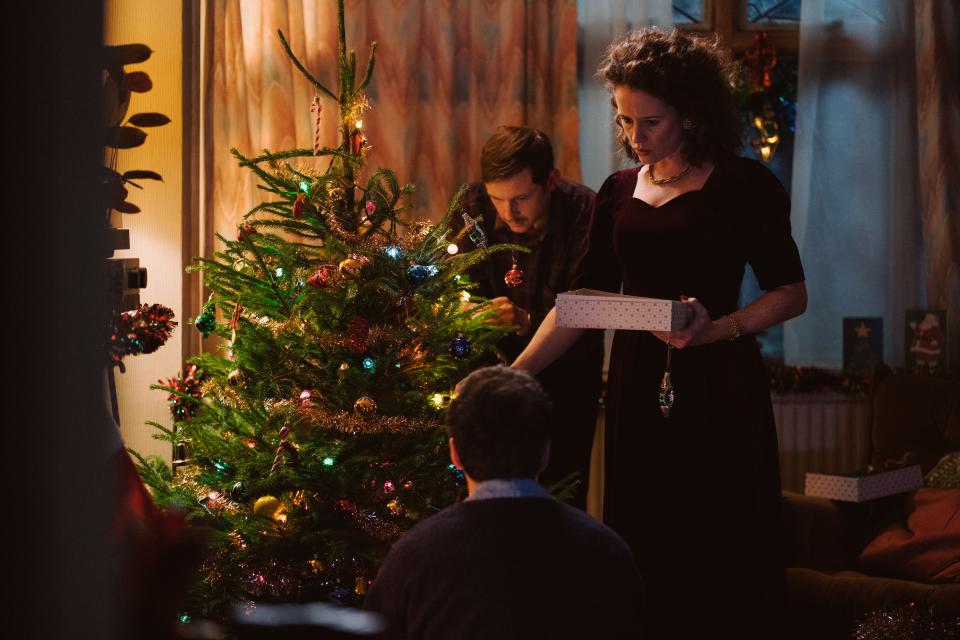
Strangers
To get there, Haigh took no shortcuts, even shooting the parts of the film in Adam’s childhood home in the house he grew up in. “As I was writing, I pictured my own home—and I hadn't been back there for 42 years,” he says. “So just like Adam in the film steps over that boundary into his old house, I was doing the same thing. I was going into my old house, I was filming in my parents' old bedroom and my old bedroom as a child.”
It took a toll on Haigh, who found himself suddenly breaking out in eczema, which hadn’t happened to him since he was a kid.
“I’m not sure if it was foolish emotionally,” Haigh says. “It was difficult and strange, but I kind of like throwing myself into a situation that most people will be like, ‘No, don't do that. It's not good for you emotionally.’ I'm like, ‘No, I want to see what happens. I want to see what happens if I have to go and shoot those scenes in my old house.’”
But any images of a tortured artist eager to lacerate himself at the foot of his art are dispelled by his cast. “It's one of those [strange] things,” Scott tells me. “Because his films are quite hard-hitting, aren't they? He's a really funny guy,”
On set, Scott found Haigh to be a light, gentle presence. “That’s an extraordinary, generous thing to do,” Scott says, about the director’s decision to put himself on the line, emotionally, for the film. “He wore it so lightly. He really did. And the atmosphere on set—which is not to be underestimated—was so lovely. He's very popular with the crew.”
The feat Haigh pulls off in All of Us Strangers, reminds me of an artist who made herself known at the same time Yamada was releasing Strangers—Sinead O’Connor, the late Irish singer-songwriter revered for her interpretative abilities as much as for her fearless songwriting. O’Connor was catapulted to superstardom with a cover of Prince’s “Nothing Compares 2 U” that revealed a dimension of the song that wasn’t there before—a kind of conflicted, weary, unresolved grief that found a voice in O’Connor’s reading.
“Every time I sing that song I think of my mother,” the singer once said. “I never stop crying for my mother.” O’Connor’s mother died in a car crash when she was 18 but when she was alive, O’Connor says that she was devastatingly abusive. On the song, when O’Connor sings, “All the flowers that you planted, mama, in the backyard,” you can hear the child in her, mourning the promise of unconditional love that never came.
In the same way, in All of Us Strangers, the bones of the story are the original author’s but the artist draws enough blood from his own flesh to make it his own, transforming the text into something personal. Art that powerful doesn’t make the artist’s trauma okay, but it does tell a young kid somewhere that life is survivable, that you might even be able to harness the wreckage around you into something that becomes a lifeline to someone else. What do we learn from a feat like that, if not hope?
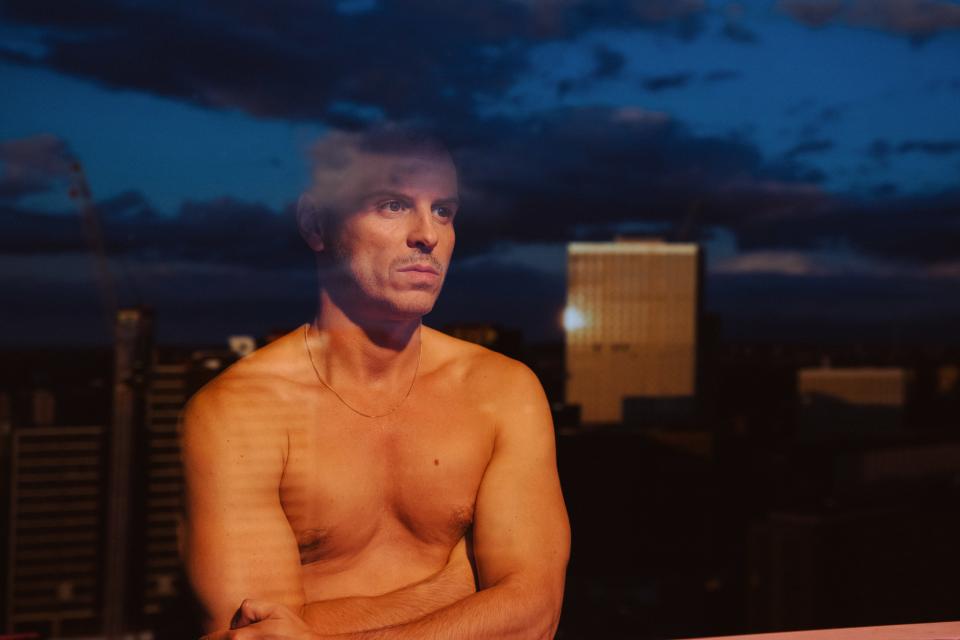
Strangers
“In many ways it's about me understanding my past and understanding my own teenage life,” Haigh says. “I'm in that generation that grew into their sexuality in the early 80s, when people were dying of AIDS and we didn't see a future for our lives. I did not think that I'd ever be able to be with a man or be in love or live with [someone]—it didn't feel possible.”
By the time I see Haigh again at the start of winter, at the same hotel cafe where I met him two months before, it’s clear that Strangers is a kind of breakthrough for him. Already, it’s being discussed as one of the year’s best films and is hotly tipped to figure into the awards season. Incredulously, for the first time in the career of one of our great filmmakers, there is real, deafening mainstream excitement around his work.
But true to form, the typically self-deprecating Haigh shrugs it off. After all, he’s worked long enough to remember how the opposite response feels like.
After 45 Years picked up a surprise Oscar nomination for the actress Charlotte Rampling in 2016, everyone expected Haigh’s next film Lean On Pete, released by a then-burgeoning A24, to take him to the next level. Instead, while it received great notices from critics, Lean On Pete kind of came and went.
The same could be said for the two TV shows that Haigh has directed, the cult favorite Looking, which ran on HBO from 2014 to 2016, and The North Water, an adaptation of Ian McGuire’s same-titled novel that starred Colin Farrell and was unfortunately released in 2020, two whole years before the eventual Farrellissance.
“You spend all that time and then it comes out and everyone's like, ‘Yeah.’” Haigh shrugs. “It's tough. I take it to heart—I’m a sensitive person. And so the disappointments definitely affect me. And you worry and you think, ‘Is that it for me? Am I ever going to make something else that breaks through?’”
We talk about the careers of other auteurs who had a taste of Oscar glory only to follow it up with projects that went deeper into their sensibilities. We talk about how Pedro Almodovar followed up his Oscar nod for Women On the Verge of a Nervous Breakdown with Tie Me Up! Tie Me Down! and High Heels, two of his most idiosyncratic films. We talk about how Gus Van Sant did Gerry, Last Days and Elephant after the mainstream embrace of Good Will Hunting.
Later, Haigh tells me stories about working for James Ivory and Ismail Merchant as an assistant early in his career. Ivory, he points out, only won his Oscar five years ago, at 89 years old—setting a record for the oldest Oscar winner ever. And he didn’t even win one for one of the many classics he directed—he did so for his screenplay for Luca Guadagnino’s Call Me By Your Name.
“Some directors get lifted up and some directors—even if they're brilliant—just get kept down below a little bit,” Haigh says about Ivory. “I think the whole Oscar idea and success, as a filmmaker, you realize it's [about] a different thing. It doesn't necessarily mean better films.”
In Haigh’s case, it’s not hard to understand it. We live in a time obsessed with multiverses, blockbuster IP and extraordinary superheroes. Haigh meanwhile, makes films about the exceedingly ordinary. These are stories of unexceptional people with unexceptional destinies. They make the most of what they can with the life that’s given to them. Haigh considers these characters with radical empathy, never passing moral judgment; instead giving them space for complexity
“Everybody is very, very complicated,” Haigh says. “They're a product of what's happened to them. The idea that we are active players in our own lives is not really true. We're passive most of the time and we're just reacting to how we get treated and what's happened to us in our lives.”
The evening before our coffee, Haigh was at a screening in the Museum of Modern Art in New York, as part of a series geared toward critics and awards voters. It’s become a regular stop for Oscar contenders going into winter. And after months of doing promo without his actors due to the actors’ strike, Haigh was accompanied to the screening by his stars Andrew Scott and Jamie Bell.
At the end of that screening, Bell told the audience about his own family, how his father walked out on them before he was born, and how playing a father in Strangers, he found himself acting out conversations and scenarios he never actually experienced in his life. In playing the character, Bell said, he found himself acting as the father he never had.
Looking out at the audience, his director and co-star beside him, he said: “It’s amazing how cinema can sometimes fill those spaces, and help you heal.”
Originally Appeared on GQ

